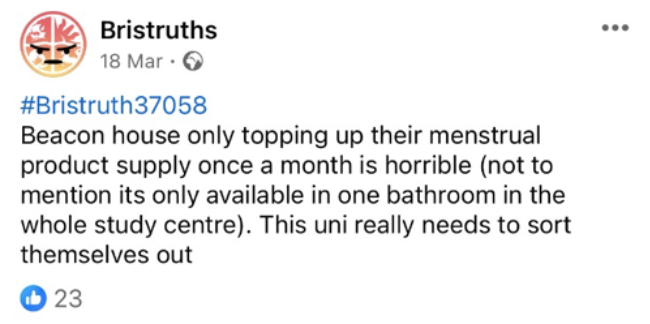

Why Bristol University's Current Menstrual Product System Isn’t Enough—And Why We Need Sustainable Solutions
Sep 23, 2024
2 min read
5
18
0
Period poverty is a crisis that affects millions of students across the UK, preventing them from reaching their full potential. For 3 in 10 girls, the choice is devastatingly simple yet impossible: menstrual products or basic necessities. This harsh reality forces over half of them to resort to using toilet paper, highlighting the urgent need for change. When students are burdened by managing their periods instead of focusing on their education, their opportunities—and futures—are unfairly limited.
This is the injustice Pleasantri aims to tackle.
In 2021, the University of Bristol’s Students’ Union launched an initiative to ease the financial burden of menstrual care by providing free sanitary products in select university bathrooms. While this effort was a step in the right direction, it has significant shortcomings: the system is inconsistent, often unreliable, and reliant on donations, which undermines its sustainability.
Period poverty is not just a social issue—it’s an economic one with far-reaching consequences. When girls miss school due to lack of access to menstrual products, they’re not just skipping classes; they’re missing opportunities to learn, participate, and thrive. This disruption affects their academic progress, self-esteem, and long-term career prospects.
The impact extends beyond the individual—when young women are held back from reaching their full potential, society loses out on their talents and contributions. Addressing period poverty is about more than just providing products; it’s about ensuring that all students have an equal chance to succeed and contribute meaningfully to their communities and the economy. Failing to tackle this issue means failing our future.
At Pleasantri, we have been monitoring the effectiveness of the current system and have encountered several empty donation boxes, as well as bathrooms that appear to have never had products available (see image below of the Merchant Venture Building). Having to search for the one bathroom stocked with sanitary products adds unnecessary stress and contributes to the indignity of being caught off guard by one’s cycle.
We are not alone in noticing these flaws; concerns have surfaced in university chatrooms, where many students have expressed frustration over the system's inconsistency (see image below).
Pleasantri is committed to tackling period poverty at its core with a sustainable and reliable approach that goes beyond temporary fixes. Our mission is to provide free sanitary products to students in schools and universities across the UK and India, ensuring that access to menstrual products is recognised as a right, not a privilege. By integrating purposeful advertising into our model, we’re creating a self-sustaining system that supports those in need while fostering positive brand engagement.
This initiative isn’t just about distributing products—it’s about creating a lasting impact that empowers students to focus on their education without the constant worry of inadequate menstrual care. It’s time for comprehensive solutions that address this inequality head-on. As a society, we must do better to ensure that no student is forced to choose between basic necessities and their well-being. Together, we can build a future where every student has the resources they need to thrive.
Sep 23, 2024
2 min read
5
18
0














